副词
副词细解(很全面哦)
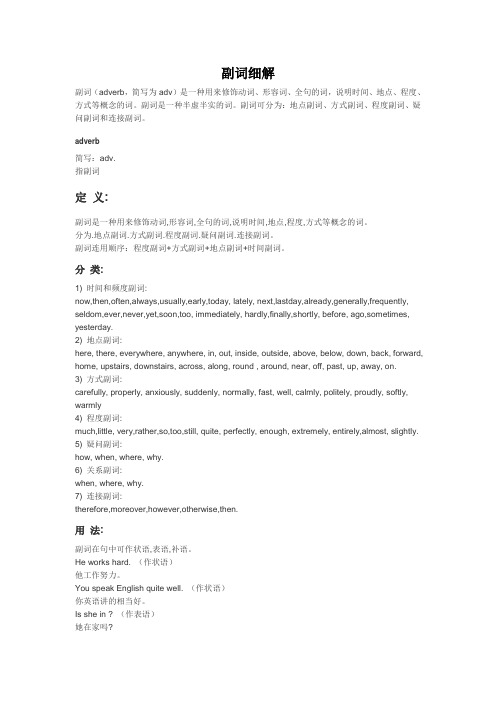
副词细解副词(adverb,简写为adv)是一种用来修饰动词、形容词、全句的词,说明时间、地点、程度、方式等概念的词。
副词是一种半虚半实的词。
副词可分为:地点副词、方式副词、程度副词、疑问副词和连接副词。
adverb简写:adv.指副词定义:副词是一种用来修饰动词,形容词,全句的词,说明时间,地点,程度,方式等概念的词。
分为.地点副词.方式副词.程度副词.疑问副词.连接副词。
副词连用顺序:程度副词+方式副词+地点副词+时间副词。
分类:1) 时间和频度副词:now,then,often,always,usually,early,today, lately, next,lastday,already,generally,frequently, seldom,ever,never,yet,soon,too, immediately, hardly,finally,shortly, before, ago,sometimes, yesterday.2) 地点副词:here, there, everywhere, anywhere, in, out, inside, outside, above, below, down, back, forward, home, upstairs, downstairs, across, along, round , around, near, off, past, up, away, on.3) 方式副词:carefully, properly, anxiously, suddenly, normally, fast, well, calmly, politely, proudly, softly, warmly4) 程度副词:much,little, very,rather,so,too,still, quite, perfectly, enough, extremely, entirely,almost, slightly.5) 疑问副词:how, when, where, why.6) 关系副词:when, where, why.7) 连接副词:therefore,moreover,however,otherwise,then.用法:副词在句中可作状语,表语,补语。
30个副词英语

30个副词英语副词是一类在句子中修饰动词、形容词、副词、全句或者整个句子的词语。
它们可以提供更多的细节和信息,丰富句子的表达。
在英语中,副词扮演着重要角色,使得句子更加生动有力。
下面将为你介绍30个常用的英语副词。
1. Adoringly(崇拜地)- She looked at him adoringly, impressed by his talent.2. Angrily(生气地)- He shouted angrily at the referee after the game.3. Briskly(轻快地)- The dog walked briskly through the park, excited to be outside.4. Carefully(小心地)- She handled the fragile vase carefully, fearing it might break.5. Deliberately(故意地)- He deliberately ignored her, wanting to geta reaction.6. Eagerly(渴望地)- The children eagerly lined up for ice cream on a hot summer day.7. Frantically(疯狂地)- She searched frantically for her lost keys, turning the house upside down.8. Gently(温柔地)- The mother held her baby gently, rocking him to sleep.9. Happily(开心地)- They danced happily at the wedding, celebrating the couple's joy.10. Incessantly(不停地)- The rain fell incessantly throughout the night, keeping them awake.11. Joyfully(快乐地)- The children laughed joyfully as they played in the park.12. Luxuriously(奢侈地)- They enjoyed a luxuriously appointed hotel suite on their vacation.13. Mysteriously(神秘地)- The magician disappeared mysteriously behind the curtain, leaving the audience in awe.14. Nervously(紧张地)- He tapped his fingers nervously on the table, waiting for the interview to start.15. Optimistically(乐观地)- Despite the challenges, she approached the situation optimistically.16. Patiently(耐心地)- The teacher patiently explained the concept to the confused student.17. Quickly(快速地)- He ran quickly to catch the bus before it left.18. Reluctantly(勉强地)- She reluctantly accepted the invitation, knowing she had other commitments.19. Seriously(认真地)- He studied seriously for the exam, determined to achieve a high score.20. Tightly(紧紧地)- She hugged her friend tightly, not wanting to let go.21. Unbelievably(难以置信地)- The news of their engagement was unbelievably exciting.22. Vividly(生动地)- The author described the scene vividly, making readers feel like they were there.23. Wistfully(留恋地)- He looked wistfully at the old photo, reminiscing about the past.24. Yearningly(渴望地)- The athlete yearned yearningly for victory, training hard every day.25. Zealously(热情地)- She worked zealously on her project, determined to make it the best.26. Abruptly(突然地)- The phone rang abruptly, startling everyone in the room.27. Carelessly(粗心地)- She carelessly knocked over the glass, causing it to shatter.28. Honestly(诚实地)- He spoke honestly about his mistakes, wanting to make amends.29. Painfully(痛苦地)- The injured player walked painfully off the field, clutching his leg.30. Quietly(安静地)- They sat quietly in the library, studying for their exams.这些副词可以帮助你丰富句子的表达,使其更具感染力和准确性。
常见的副词有哪些

常见的副词有哪些
1、表示程度:非常、绝对、极度、十分、最、顶级、太、更、极其、格外、分外、一直、才、总
2、表示范围:也、都、全部、总体、总共、共、统统、又、仅仅、只、光、一概
3、表示时间、频率:已经、曾经、早已、刚刚、正、正在、就、就要、将、将要、曾、刚、才、在
4、表示肯定、否定:不、非、没、没有、不用(甭)、必、必须、必定、准、的确、未、别
5、表示情态、方式:忽然、猛然、公然、特意、亲自、大肆、肆意
6、表示语气:难道、决、岂、反正、也许、大约、大概、果然、居然、竟然、究竟
7、表示地点:家、这里、那里、每一处、楼上楼下、随时随地、无处不在、国外,在其他地方。
汉语副词大全
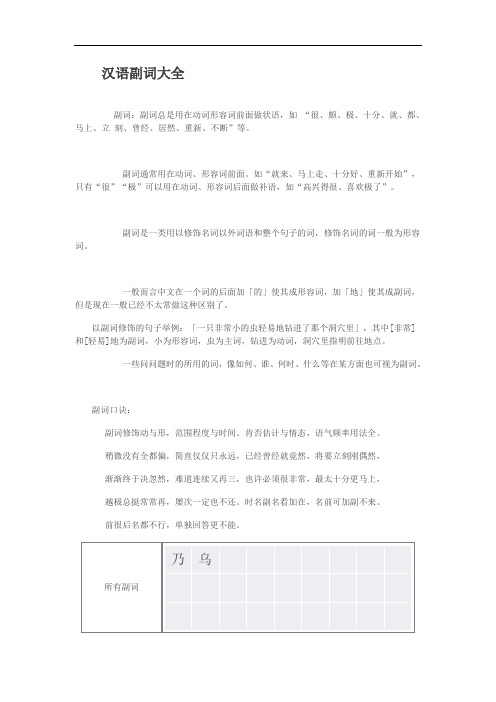
汉语副词大全
副词:副词总是用在动词形容词前面做状语,如“很、颇、极、十分、就、都、马上、立刻、曾经、居然、重新、不断”等。
副词通常用在动词、形容词前面。
如“就来、马上走、十分好、重新开始”,只有“很”“极”可以用在动词、形容词后面做补语,如“高兴得很、喜欢极了”。
副词是一类用以修饰名词以外词语和整个句子的词,修饰名词的词一般为形容词。
一般而言中文在一个词的后面加「的」使其成形容词,加「地」使其成副词,但是现在一般已经不太常做这种区别了。
以副词修饰的句子举例:「一只非常小的虫轻易地钻进了那个洞穴里」,其中[非常]和[轻易]地为副词,小为形容词,虫为主词,钻进为动词,洞穴里指明前往地点。
一些问问题时的所用的词,像如何、谁、何时、什么等在某方面也可视为副词。
副词口诀:
副词修饰动与形,范围程度与时间。
肯否估计与情态,语气频率用法全。
稍微没有全都偏,简直仅仅只永远,已经曾经就竟然,将要立刻刚偶然,
渐渐终于决忽然,难道连续又再三,也许必须很非常,最太十分更马上,
越极总挺常常再,屡次一定也不还。
时名副名看加在,名前可加副不来。
前很后名都不行,单独回答更不能。
汉语副词大全
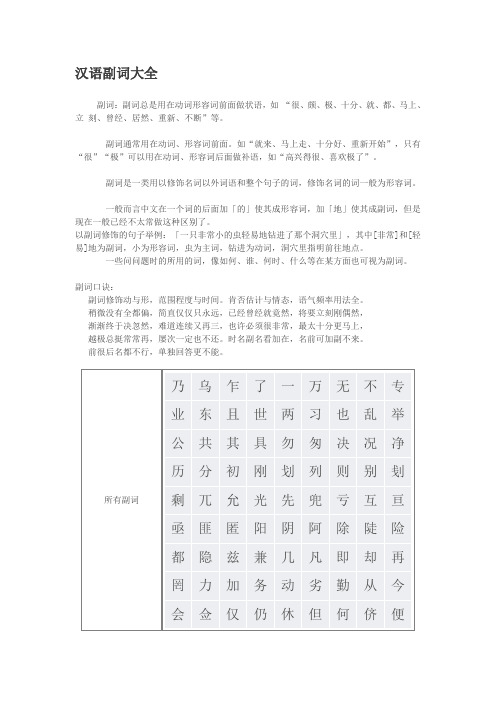
汉语副词大全
副词:副词总是用在动词形容词前面做状语,如“很、颇、极、十分、就、都、马上、立刻、曾经、居然、重新、不断”等。
副词通常用在动词、形容词前面。
如“就来、马上走、十分好、重新开始”,只有“很”“极”可以用在动词、形容词后面做补语,如“高兴得很、喜欢极了”。
副词是一类用以修饰名词以外词语和整个句子的词,修饰名词的词一般为形容词。
一般而言中文在一个词的后面加「的」使其成形容词,加「地」使其成副词,但是现在一般已经不太常做这种区别了。
以副词修饰的句子举例:「一只非常小的虫轻易地钻进了那个洞穴里」,其中[非常]和[轻易]地为副词,小为形容词,虫为主词,钻进为动词,洞穴里指明前往地点。
一些问问题时的所用的词,像如何、谁、何时、什么等在某方面也可视为副词。
副词口诀:
副词修饰动与形,范围程度与时间。
肯否估计与情态,语气频率用法全。
稍微没有全都偏,简直仅仅只永远,已经曾经就竟然,将要立刻刚偶然,
渐渐终于决忽然,难道连续又再三,也许必须很非常,最太十分更马上,
越极总挺常常再,屡次一定也不还。
时名副名看加在,名前可加副不来。
前很后名都不行,单独回答更不能。
英语副词分类 方面副词
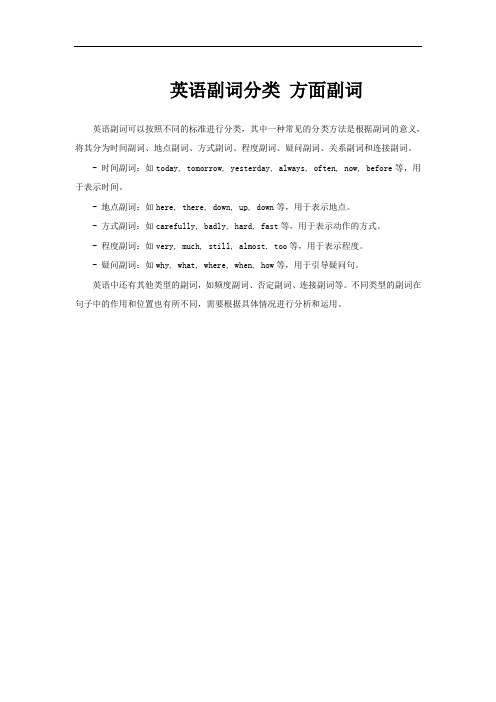
英语副词分类方面副词
英语副词可以按照不同的标准进行分类,其中一种常见的分类方法是根据副词的意义,将其分为时间副词、地点副词、方式副词、程度副词、疑问副词、关系副词和连接副词。
- 时间副词:如today, tomorrow, yesterday, always, often, now, before等,用于表示时间。
- 地点副词:如here, there, down, up, down等,用于表示地点。
- 方式副词:如carefully, badly, hard, fast等,用于表示动作的方式。
- 程度副词:如very, much, still, almost, too等,用于表示程度。
- 疑问副词:如why, what, where, when, how等,用于引导疑问句。
英语中还有其他类型的副词,如频度副词、否定副词、连接副词等。
不同类型的副词在句子中的作用和位置也有所不同,需要根据具体情况进行分析和运用。
副词常用副词的用法及位置
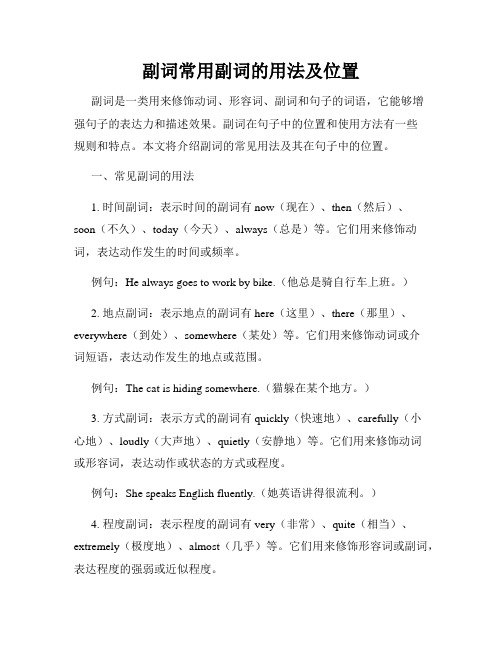
副词常用副词的用法及位置副词是一类用来修饰动词、形容词、副词和句子的词语,它能够增强句子的表达力和描述效果。
副词在句子中的位置和使用方法有一些规则和特点。
本文将介绍副词的常见用法及其在句子中的位置。
一、常见副词的用法1. 时间副词:表示时间的副词有now(现在)、then(然后)、soon(不久)、today(今天)、always(总是)等。
它们用来修饰动词,表达动作发生的时间或频率。
例句:He always goes to work by bike.(他总是骑自行车上班。
)2. 地点副词:表示地点的副词有here(这里)、there(那里)、everywhere(到处)、somewhere(某处)等。
它们用来修饰动词或介词短语,表达动作发生的地点或范围。
例句:The cat is hiding somewhere.(猫躲在某个地方。
)3. 方式副词:表示方式的副词有quickly(快速地)、carefully(小心地)、loudly(大声地)、quietly(安静地)等。
它们用来修饰动词或形容词,表达动作或状态的方式或程度。
例句:She speaks English fluently.(她英语讲得很流利。
)4. 程度副词:表示程度的副词有very(非常)、quite(相当)、extremely(极度地)、almost(几乎)等。
它们用来修饰形容词或副词,表达程度的强弱或近似程度。
例句:I'm very happy to see you.(见到你我很高兴。
)5. 频率副词:表示频率的副词有often(经常)、sometimes(有时候)、rarely(很少)、never(从不)等。
它们用来修饰动词,表达动作发生的频率或概率。
例句:She rarely eats fast food.(她很少吃快餐。
)二、副词在句子中的位置1. 修饰动词:副词通常放在动词之前,用来修饰动词,表示动作的方式、时间、地点等。
语文常用副词举例
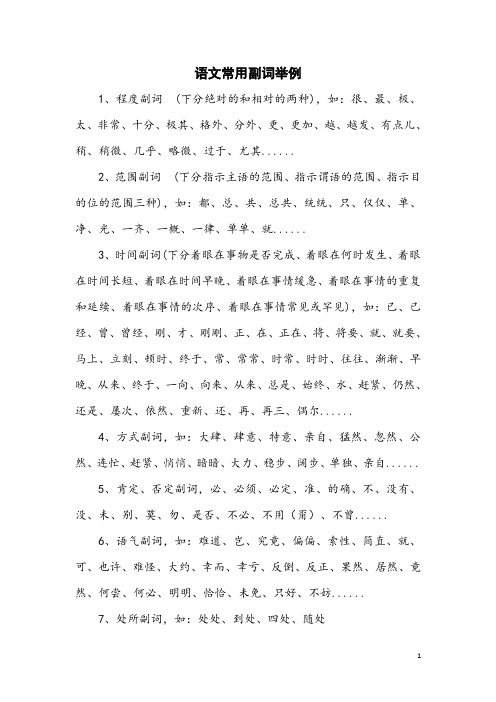
语文常用副词举例1、程度副词(下分绝对的和相对的两种),如:很、最、极、太、非常、十分、极其、格外、分外、更、更加、越、越发、有点儿、稍、稍微、几乎、略微、过于、尤其......2、范围副词(下分指示主语的范围、指示谓语的范围、指示目的位的范围三种),如:都、总、共、总共、统统、只、仅仅、单、净、光、一齐、一概、一律、单单、就......3、时间副词(下分着眼在事物是否完成、着眼在何时发生、着眼在时间长短、着眼在时间早晚、着眼在事情缓急、着眼在事情的重复和延续、着眼在事情的次序、着眼在事情常见或罕见),如:已、已经、曾、曾经、刚、才、刚刚、正、在、正在、将、将要、就、就要、马上、立刻、顿时、终于、常、常常、时常、时时、往往、渐渐、早晚、从来、终于、一向、向来、从来、总是、始终、水、赶紧、仍然、还是、屡次、依然、重新、还、再、再三、偶尔......4、方式副词,如:大肆、肆意、特意、亲自、猛然、忽然、公然、连忙、赶紧、悄悄、暗暗、大力、稳步、阔步、单独、亲自......5、肯定、否定副词,必、必须、必定、准、的确、不、没有、没、未、别、莫、勿、是否、不必、不用(甭)、不曾......6、语气副词,如:难道、岂、究竟、偏偏、索性、简直、就、可、也许、难怪、大约、幸而、幸亏、反倒、反正、果然、居然、竟然、何尝、何必、明明、恰恰、未免、只好、不妨......7、处所副词,如:处处、到处、四处、随处举例如下:1 能打赢就打,打不赢就走。
2 他刚刚从美国回来。
3 老师将要到香港讲学。
4 我常常失眠。
5 这件事昨天我已经知道了。
6 你先去我马上就到。
7 他大概知道了事情的结局。
8 这真是越忙越乱。
9 这结婚的场面太宏大了,光轿车就有十几辆。
10 他就不听你的,你能怎么办?。
- 1、下载文档前请自行甄别文档内容的完整性,平台不提供额外的编辑、内容补充、找答案等附加服务。
- 2、"仅部分预览"的文档,不可在线预览部分如存在完整性等问题,可反馈申请退款(可完整预览的文档不适用该条件!)。
- 3、如文档侵犯您的权益,请联系客服反馈,我们会尽快为您处理(人工客服工作时间:9:00-18:30)。
副词定义:副词是用来修饰限制动词、形容词其他副词或句子的,说明时间、地点、程度、方式等概念。
时间副词:today, now, already, soon·地点副词:here, home, out```一.副词的分类方式副词: well, quietly, quickly````程度副词: much, rather, too,enough频率副词: usually, never, hardly ,once疑问副词: when, where, how, how often连接副词: so, unless, though, however二.副词的功能三.副词的位置和排序四.比较等级原级比较级最高级五.兼有两种形式的副词六.易混点清单1.时间副词时间副词:today,early,soon,now,then,recently,still,lately,注意:掌握不同时态的时间标志2. 地点副词地点副词:here,there,out,somewhere,abroad,home,注意:地点副词和动词连用时不加介词3. 方式副词:well, quietly, quickly,loudly, fast, again大多数由“形容词+-ly”组成4. 程度副词:much, rather, too,enough有些修饰原级,有些修饰比较级5. 频率副词: usually, never, hardly ,once6. 疑问副词: when, where, how, how often7. 否定副词:no,not,neither,nor,8. 连接副词:so, unless, though, however副词在句中可作状语,表语,定语,宾语补足语。
1)作状语:He works hard. 他工作努力。
You speak English quite well. 你英语讲的相当好。
2)作表语Is shein ? 她在家吗?The fire has beenout for half an hour. 火已经熄灭半个小时了。
3)作定语在那边的那个人在等你。
I went to see him only to find him out. 我去看他,不料他不在家。
三.副词的位置1.地点副词、时间副词、方式副词一般位于句末I will meet him at the station tomorrow.Tomorrow I will meet him at the station.(有时为了强调时间,也可把时间副词放在句首)The boy did his homework quickly.The students all worked well here last week,2.频度副词的位置有两种(1)在be 动词、情态动词及第一个助动词之后She is always kind to me.The work has never been done.(2)实义动词之前He often goes to school early.3.程度副词的位置有两种(1)修饰动词时,它在句中的位置与频度副词情况相同He is almost 40.He can hardly understand you.Ireally like the boy.(2) 修饰形容词、副词时,谓语所修饰的词前面He studies much harder now.He runs fast enough.4. 副词的排序问题1) 时间,地点副词,小单位的在前,大单位在后。
2) 方式副词,短的在前,长的在后,并用and或but等连词连接。
Please write slowly and carefully.3) 多个不同副词排列:程度+地点+方式+时间副词。
注意:副词very 可以修饰形容词,但不能修饰动词。
改错:(错) I very like English.(对) I like English very much.注意:副词enough要放在副词的后面,形容词enough放在名词前后都可。
I don't know him well enough.There is enough food for everyone to eat.There is food enough for everyone to eat.四.副词的比较等级1.副词的比较级、最高级的变法和形容词的比较级、最高级变法基本相同。
2.副词最高级前一般不加定冠词theLin Tao did best in English of all.3.不规则变化1.─ This box is ___ heavy for me to carry. Can you help me ? ─ Certainly.(06,湖北武汉)A. soB. muchC. veryD. too2. –Mr Smith, would you please speak a little more ______?-- Sorry! I thought you could follow me.(07,安徽)A. quietlyB. quicklyC. slowlyD. politely3. -- I always listen to the teacher _______ in class-- It’s very clever of you to do that.(07,重庆)A.free B.freely C.careful D. carefully4. --Tom is terribly ill.--We’d better send him to hospital as _____as we can.(05,随州)A.slowly B.quickly C.quietly D.easily5. Helen learns to dance three times a week. Now she dances ___________ Anita does.(08,江苏宿迁)A. so good asB. as well asC. as good asD. so well as6. Relax_!______you finish this English exam,you’11 be free and feel on top of the world.You can make it if you put your heart into it!(09,哈尔滨)A.As well as B.As soon as C.As good as7. We are glad to see that Shanghai is developing ________ these years than ever before.(05,上海)A quicklyB less quicklyC more quicklyD the most quickly8. Will you please drive______? The train is leaving soon. (06,福建南平)A. quickB. fasterC. slowlyD. more slowly9. Jenny goes to school ________ than any other student in her class.(08,上海)A earlyB earlierC earliestD the earliest10. —Mark speaks English well, but you____________ him.—Thank you. (09,常州).A. speak as badly asB. speak worse thanC. don’t speak so badly asD. speak much better than11. Though the famous dancer TanLihua, is deaf, she dancesmost of the people.(06,山东莱芜)A.as good asB.as well asC.best amongD.better than12. Amy makes fewer mistakes than Frank.She does her homework______.(07,南京)A more carefully B.more carelesslyC.more careful D.more careless13. –Who gets up _______, your father or your mother?--My mother.(07,长沙)A. earlyB. earlierC. earliest14. Nowadays meteorologists (气象学家) can make good forecast for 3 or 5 days. Perhaps soon they may be able to do that for a week or ______.(08,山东)A. more aheadB. more behindC. less aheadD. less behind15. The traffic is so heavy! You should drive __________than before.(09.安徽芜湖)A. very quicklyB. more quicklyC. very carefullyD. more carefully16. Of all the students, Linda draws ________ carefully .(08,北京朝阳)A. veryB. muchC. moreD. most17. Daniel is a careful driver, but he drives _______ of my friends.(08,苏州)A. more carefullyB. the most carefullyC. less carefullyD. the least carefullyclose意思是"近";He is sitting close to me.closely 意思是"仔细地,亲密地" ,:Watch him closely.late意思是"晚";You have come too late.lately 意思是"最近" What have you been doing lately?deep意思是"深",表示空间深度;He pushed the stick deep into the mud.deeply时常表示感情上的深度,"深深地" Even father was deeply moved by the film.high表示空间高度;The plane was flying high.highly表示程度,相当于much;I think highly of your opinion.wide表示空间宽度;He opened the door wide.widely意思是"广泛地","在许多地方" English is widely used in the world.free的意思是"免费";You can eat free in my restaurant whenever you like.freely 的意思是"无限制地" You may speak freely; say what you like.already用于肯定句句中,表示“已经”yet用于否定句句末,表示“还”,用于疑问句句末,表示“已经”e.g. He had already left when I called.当我给他打电话时,他已经离开了。
